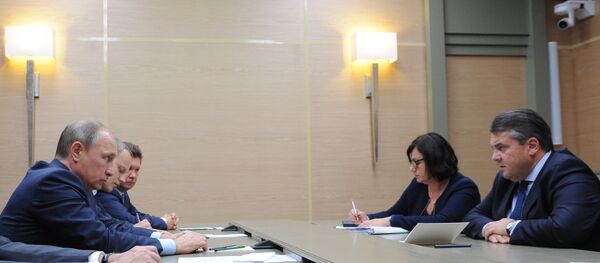According to Levada's findings, the number of Russians who consider it essential for Russia to improve relations with Western countries has dropped from 23% to 15% compared to this time last year. The number of those who 'would sooner like' to see a normalization of relations has also fallen, from 52% to 47%. Meanwhile, the number of those 'opposed' or 'categorically opposed' to improving relations has risen, from 14% to 18% and from 2% to 6%, respectively.
Some Russian experts and liberal media sympathetic to the West have warned that the results demonstrate that Russians' consciousness is 'changing for the worse,' with people, growing accustomed to 'living with the mentality of a besieged fortress'.
But as Svobodnaya Pressa contributor Andrei Ivanov explained, the reality is more complicated.
"First of all," the journalist noted, "a majority of Russians are still inclined to thinking that putting relations right is necessary. But the question immediately arises: how can this be done? Russia never closed itself off from the world; the country's leaders have consistently emphasized that they are ready for dialogue on any problems, and that Moscow would be only too happy to be able to find a compromise on some particular issue."
The main problem, according to Ivanov, "is that the West is not ready to make serious concessions to Russia, or to change its outlook on Russia's place in the world. Sanctions against us remain in place, Crimea is not recognized as Russian, and top US politicians continue to demonize our country." Accordingly, in the current environment, "improving relations with the West in the broad sense is not possible, however much ordinary Russians might want this."
An important caveat, the journalist emphasized, is that "one should not confuse foreign policy with the West's cultural influence. Russians still love American movies, European art and Western authors."
Sergei Chernyakhovsky, professor of history and political theory at Moscow State University, told Svobodnaya Pressa that it's only logical that fewer and fewer Russians are inclined to want to make concessions to the US.
"We see in the example of the agreements on Syria that [the US] will use any agreement to build up their strength and then break the agreement." Events in Ukraine in February 2014 are another "example of what it means to come to an agreement with the West. Yanukovych made concessions, and Western countries immediately went on the offensive. Therefore, Russians are saying that compromise is not necessary."
For his part, Andrei Manoilo, a member of the Russian Security Council, explained that an improvement in relations is inevitable; it simply requires patience, until Washington admits that its efforts to preserve its global hegemony are no longer feasible.
"Washington may not like this new balance of power, but they will admit its existence. In this regard, a balance will form when our opponent sees that Russia is calm, and confident in the future. We must show that we will stick to our positions regardless of the situation."
Moscow, Manoilo noted, is already in the process of trying to build that new balance. "When that balance is created, everyone will come to an understanding of the rules of the game, and will get the sense that Russia has a certain place in the world; then relations will be normalized." If the recent string of high-level discussions between Russian and US officials is anything to go by, that process is already underway, the analyst concluded.




